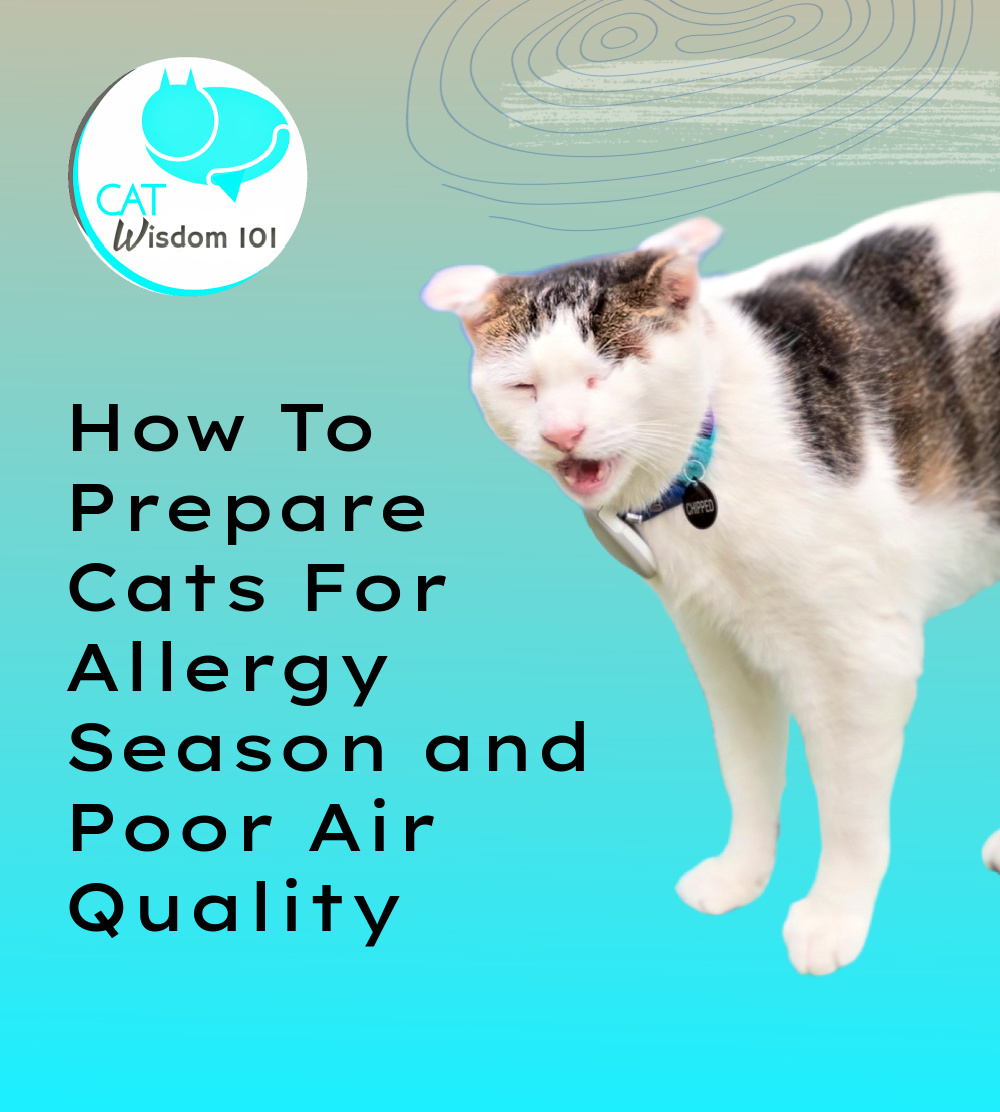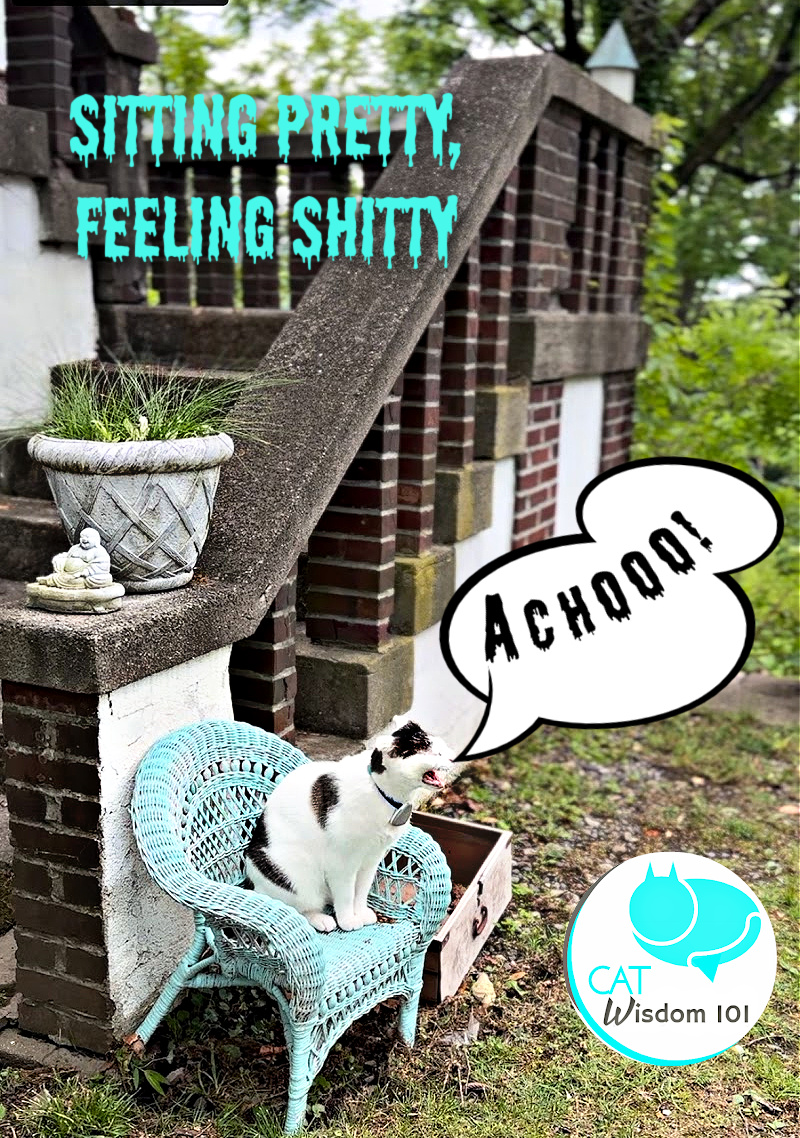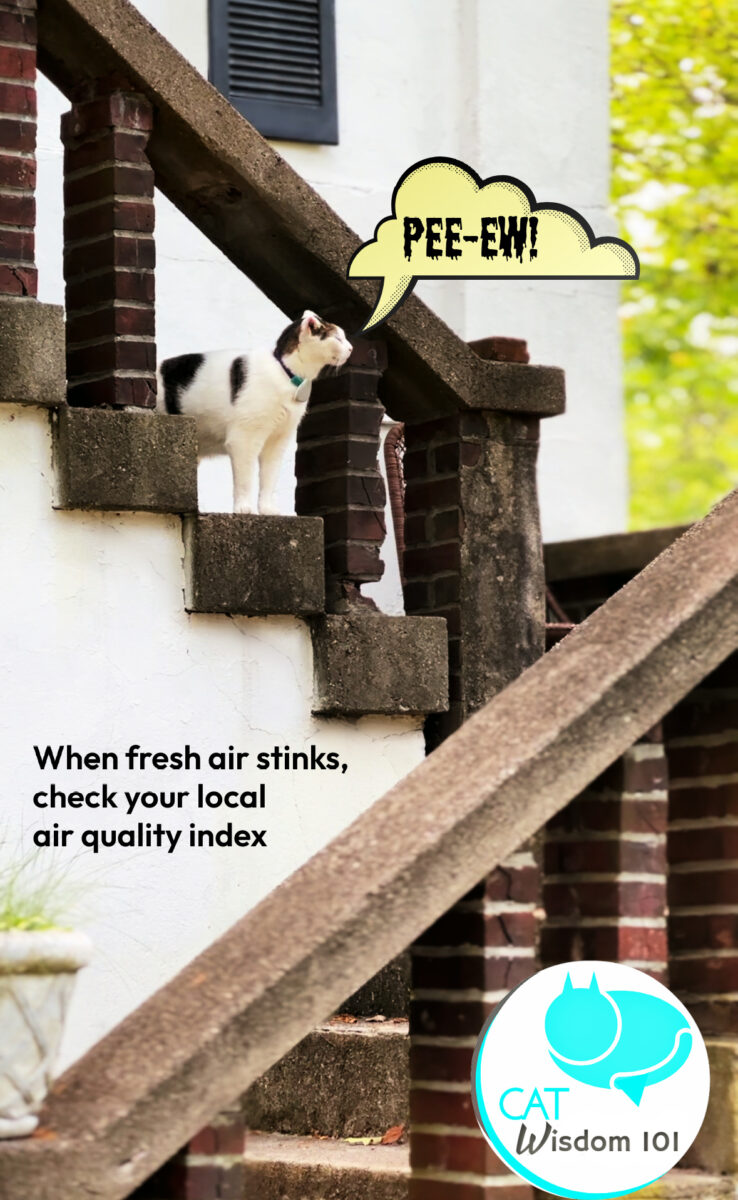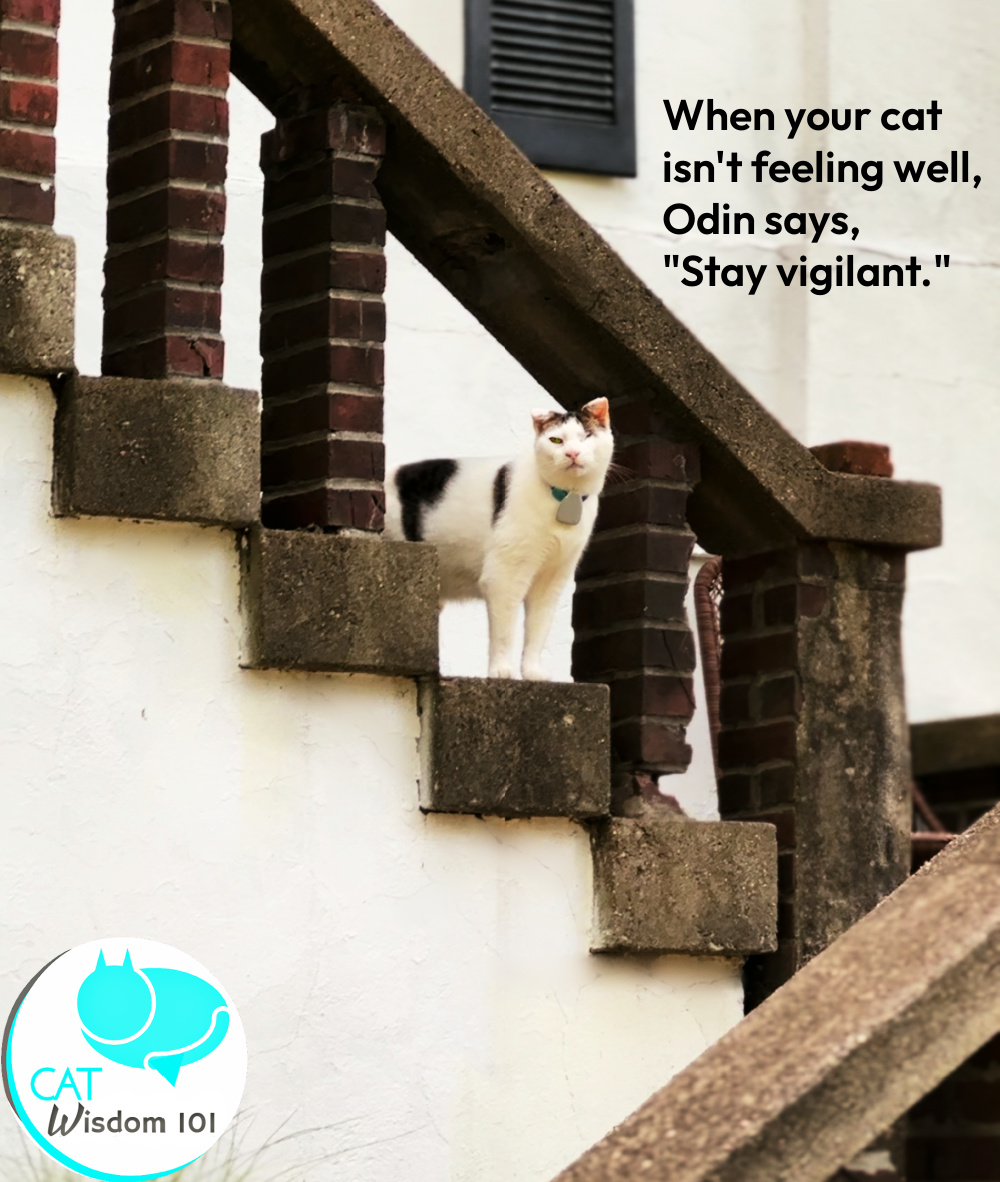
How To Prepare Cats For Poor Air Quality/Allergy Season
How To Keep Cats Safe During Poor Air Quality/Allergy Season by Layla Morgan Wilde
For the first time in Odin’s 13 years, we had to deal with a poor air quality alert. It not only impacted me but my cat, Odin. Here are my tips to prepare cats for poor air quality/allergy season. We can no longer take for granted about air quality. With global warming, we can anticipate more air quality alerts. Let’s be prepared.
Although the sky didn’t turn as orange as it did in Manhattan, we did have a red alert in normally pristine Pleasantville. It was the worst pollution I can recall, the kind you associate with large cities. What made it especially disconcerting is we live in a bucolic area with exceptionally fresh air.

The first sign that something was wrong with Odin was he didn’t want to stay outside long. He usually spends a good chunk of the day on his adventures which are monitores on his GPS collar. We were instructed to close the windows and kept Odin indoors. By then both of us were sneezing and coughing. Odin turned more sluggish and slept during the day which is rare. When Nou Nou was alive we always ran a good air purifier since she had chronic respiratory issues. It broke after she died and my bad, didn’t get a replacement. A good HEPA air purifier is my #1 Tip.
This Odin at the beginning of his bad air woes. Sitting Pretty but feeling shitty.
View this post on Instagram
If your cat’s sneezing persists or is accompanied by other concerning symptoms such as coughing, watery eyes, or difficulty breathing, it’s best to consult with a veterinarian. They can help determine the underlying cause and provide appropriate treatment.
During the height of the air quality fiasco, I discovered the excellent IQAIR website with detailed air quality report better than many weather channels. They sell air purifiers but not having tried them, I can’t recommend.
Odin was pretty miserable for a few days. We coddled him best we could and followed the following advice.
To perk up his appetite, I warmed up homemade chicken soup mixed with his favorite cat food.
I wiped his crusty nose and eyes gently with q-tips dipped in soothing rose water.
Feline respiratory issues can be caused by various factors, including pollution, summer allergies, and colds. Here are some tips to help address each of these concerns:
- Pollution or Poor Air Quality :
Ventilation and Air Circulation:
- Open windows or use fans to promote air circulation and reduce stagnant air in your home.
- Ensure that your home has proper ventilation, especially in areas where your cat spends most of its time.
- Keep your cat indoors during times of high pollution or poor air quality.
- Use air purifiers or air filters to reduce the presence of pollutants indoors. Consider using air purifiers or air filters designed to remove allergens and improve air quality. Ensure that the filters are regularly cleaned or replaced according to the manufacturer’s instructions. Consumers Report is a trusted source. This is their latest report on the Best Air Purifiers

- Regular Cleaning:
- Regularly clean your home to minimize dust and allergens that can worsen respiratory symptoms.
- Vacuum with a good HEPA filter vacuum cleanerI used to have a Dyson but recommend the less expensive Shark now.
- Dust your home regularly to minimize dust, allergens, and other particles in the environment. I like Swiffer type or damp cloths.
- Clean your cat’s bedding, toys, and any other items they come into contact with frequently to maintain cleanliness.
3. Avoid Irritants:
- Avoid smoking or using strong chemicals, air fresheners (including Febreze) or aerosol sprays in your home, as these can worsen air quality and irritate your cat’s respiratory system.
- Be cautious about using cleaning products that may contain strong chemicals and opt for pet-friendly, non-toxic alternatives.
- If the air quality is poor outside due to pollution or allergens, keep your cat indoors to minimize their exposure.
- Create an enriching indoor environment with plenty of toys, scratching posts, and interactive play to keep them stimulated.4. Monitor for Other Symptoms:
- If your cat’s sneezing persists or is accompanied by other concerning symptoms such as coughing, watery eyes, or difficulty breathing, it’s best to consult with a veterinarian. They can help determine the underlying cause and provide appropriate treatment.
Summer Allergies: See also our Vet 101: Cats Can Breathe Easy With Asthma
- Consult with a veterinarian to determine if your cat is experiencing allergies and to identify the specific allergen causing the symptoms.
- Minimize your cat’s exposure to outdoor allergens, such as pollen, by keeping them indoors during peak allergy seasons or using window screens to filter the air.
- Follow your veterinarian’s recommendations for allergy management, which may include antihistamines, topical treatments, or immunotherapy.
Colds: See our post Cats can get colds and flu too
- Provide your cat with a warm and comfortable environment to help ease cold symptoms.
- Ensure they have access to plenty of fresh water to stay hydrated.
- Offer warm, tempting (strong smelling) foods to encourage eating, as loss of appetite is common with colds.
- Keep your cat’s environment clean and free from drafts to help prevent the cold from worsening or turning into a secondary infection.
- Consult with a veterinarian if the cold symptoms persist or if your cat’s condition deteriorates.
It’s important to note that these suggestions are general in nature. If your cat is experiencing respiratory issues, it’s always best to consult with a veterinarian for an accurate diagnosis and appropriate treatment plan. They can provide personalized advice based on your cat’s specific needs and medical history.

Natural Supplements For Cats
When it comes to supporting cats with respiratory issues from allergies or poor air quality, there are some natural supplements and tips that may help alleviate symptoms. However, it’s essential to consult with a veterinarian before introducing any new supplements to your cat’s routine. I’m a big fan of supplements and Odin gets all of the following. Here are a few options to discuss with your vet:
- Omega-3 Fatty Acids:
- Omega-3 fatty acids, found in fish oil supplements, may help reduce inflammation and support respiratory health. Your veterinarian can guide you on the appropriate dosage for your cat.
- Antioxidants:
- Antioxidants like vitamins C and E can help support the immune system and reduce inflammation. Your vet may recommend specific antioxidant supplements suitable for cats.
- Quercetin:
- Quercetin is a natural flavonoid with anti-inflammatory properties. It can help stabilize cells that release histamines, which contribute to allergic reactions. Speak to your vet about appropriate dosage and form for cats. I sprinkled some into Odin’s food. He didn’t accept it until I mixed in a bit of sardine oil.
- Probiotics:
- Probiotics promote a healthy gut microbiome and may support the immune system. They can help alleviate some allergy symptoms. Ask your vet for recommendations on cat-specific probiotic supplements.
Remember, every cat is unique, and what works for one may not work for another. Your veterinarian is the best resource for assessing your cat’s specific needs and recommending appropriate supplements or management strategies for respiratory issues. They can provide guidance tailored to your cat’s health and help monitor their progress.
It’s important to stay vigilant and observant for ANY changes in your cat. For a while Odin was walking like an old mancat but I’m happy to report, he’s back to his adventure cat self.






10 Comments
Sue Brandes
Thanks for the post. We just had to buy a couple of air purifiers. This year was bad.
meowmeowmans
Thanks for the great information, Layla. That smoke from the fires was horrid. I was actually in NYC that really bad day (I go in for work on Wednesdays) … ugh!
Brian Frum
Good info, but I think it’s always allergy season where we live!
Ellen J Pilch
Hope we don’t get anymore bad air from the fires. XO
Layla Wilde
Glad you and Astor are okay. Salmon oil is a good trick!
easyweimaraner
fortunately we have such a thing to check the air… sometimes it is unbelievable that so much things from horror movies and books are reality today… sigh…
Layla Wilde
You’re lucky where you are in France.
Cathy Keisha
I have asthma so the peeps worried when the sky turned orange. I never go out, the windows stayed closed tightly and the central ac was turned on. Do not open windows or run window air conditioners with bad air. We rely on AirNow dot gov to tell us the daily air quality. Proud to note that I had no symptoms during those orange days. TW coughed a bit since she had to go out cos Pop was in hospital.
Layla Wilde
Glad you’re okay!
Amy Harlib
Fortunately during the bad air days here in Manhattan, Astor-kitty was fine since he’s as apartment cat. I was fine too except for a slight irritation in my nose that disappeared after a day or two.
All your advice is excellent though and Astor gets probiotic powder supplement in his food as well as ‘Missing Link’ powder and a few drops of salmon oil.
He snarfs it up!